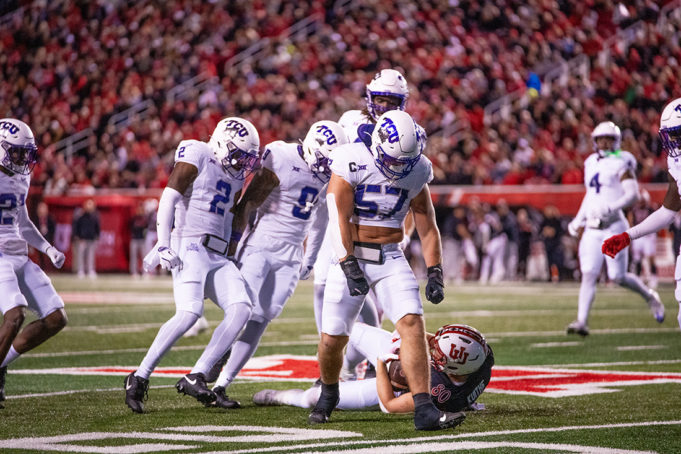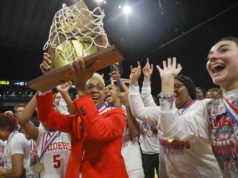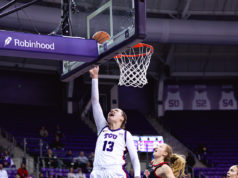I’ve always liked former Dallas Cowboys receiver Joey Galloway, a great analyst, easy on the eyes, and he spits truth from his ESPN desk most of the time, so when asked by his broadcast partner who he liked in Saturday’s nightcap in Salt Lake City before the crew signed off, he simply said: “I’m gonna take TCU, for no real reason. I don’t even feel good about it.” Gospel, Joey, gospel.
Galloway’s flippant attitude is so indicative of the mindset of Frog Nation right now. I’d just flipped over from watching Texas fans litter their own field in some sort of hyper-ironic, Don’t Mess with Texas bizarro protest after a pass interference call went against them. Alas, purple patriots were forced to endure the mountain time zone to watch yet another contest in which an enigmatic Sonny Dykes-led squad took the field with mediocrity likely to follow. The Utes dealt with problems of their own. After considered most likely to win the Big 12, Utah had lost two straight to the ’Zona schools, and their super-duper senior quarterback was injured again, leaving duties to a semi-experienced freshman.
Despite a bye week that Frog coaches and players described as transformative and physical, the Frogs drove the field and promptly fumbled in the red zone. The defense responded with a shutdown series, blocked punt, and what seemed like it would surely be redemption for an early blunder. The result was a blocked field goal and zero points despite two early trips within the shadow of Utah’s goal posts. It would take the Frogs a third journey to nab their first field goal and points of the game. Quarterback Josh Hoover was more impeccable, albeit reserved, with the football in general, and took his brethren 79 yards before his friends pushed his tuchus into the end zone for what would be the Frogs’ only touchdown of the game.
Offensively, TCU did enough in this game to limp across the first-down marker but only because the defense played unequivocally their best football of the season and in the new Andy Avalos era. Utah boasted a vaunted rushing attack, but Avalos hedged his bets against a young quarterback and committed resources to stop the run. He was punished in the secondary only once. This defense seemed like what Utah Head Coach Kyle Whittingham would remember from the Mountain West days: Purple players flew to the ball and tackled well, and the linebackers and secondary aggressively challenged the pocket. TCU defenders allowed only 12 first downs and 267 yards and stopped the Utes on both attempted fourth-down conversions. Aside from Utah’s 71-yard pass and touchdown, it didn’t feel like the Frogs gave up anything, and that was enough to gently slide the knife of distrust from fans’ ribs for them to breathe a little and to allow the wounds to scab somewhat.
It was a damn good thing the defense showed up, because TCU’s offense couldn’t score. They moved the ball fairly well against one of the better defenses they’ve played, but 403 yards and 13 points paints an appropriately pitiful picture of proficiency. Hoover still tossed the ball 41 times, completing just more than half his throws, but the essential number was zero — interceptions, that is.
The most significant individual performance was from touted receiver Savion Williams serving as a running back on direct snaps. Williams averaged more than 10 yards per carry, and Kendal Briles used the wildcat formation as the X factor the Utes just couldn’t solve. When Dykes needed to ice the game on fourth and short with barely two minutes remaining, they snapped it again to the big receiver, who bullied and bashed his way for a first down so his quarterback could kneel his way to victory.
It was a win but a dreadful one in many ways. As I languished at the end of a long Saturday, Briles could have created meaningful distance between fans and another cardiac event. No rest was enjoyed. Faithful, if they wanted to be sure TCU would win, needed to suffer all the way until 1 a.m. to know their boys improved to 2-2 in conference play. Realistically, TCU’s offense should have scored 27 points at minimum, but their grotesque inefficiency anywhere past the opponents’ 20-yard line keeps Frog Nation nervous even in first-and-goal situations. It’s difficult to believe that after an entire bye week, a major college football team with an offensive coordinator convinced he’s ready to be a head coach can’t cobble together some sort of jumbo personnel package and successfully run the ball from under center when the opponent knows that’s what they’re going to do.
Frog running back Trent Battle displayed toughness and toted the rock well from the traditional shotgun-spread formation, but Williams was the only person who was able to gain yards when the Utes knew a run was coming. I applaud the creativity in some ways, but there’s a bitter aftertaste of desperation.
The most modern configuration of the Big 12 is bleak for Texas-based teams. Tech, who the Frogs face Saturday afternoon in Fort Worth, is still a contender for the conference despite being stomped by freefalling Baylor in Lubbock last weekend for their first league loss. Houston, despite upsetting TCU the week before, is still sitting in the basement tied with the Bears with one conference win each after a lopsided loss in Lawrence. Thus, Dykes arrives to back-to-back familiar foes (Tech and Baylor) and a small possibility to save face and recruiting prowess over Lone Star counterparts. The Red Raiders are 5-2, four of those victories achieved by single possessions. The tortilla tossers roster a fine bell-cow back in Tahj Brooks. Expect the senior to get 20 or more carries as the veteran has already logged more than 800 yards on the season. Head Coach Joey McGuire is more committed to a balanced attack than Dykes but is not above attacking the secondary if Avalos chooses to put the game on the arm of Behren Morton, who is a much more capable passer than Utah’s Isaac Wilson. The Frogs will need to stop Brooks as their highest priority. The game isn’t winnable otherwise. Expect to see a more coherent passing attack from Briles’ group, if for no other reason than Houston and Utah have more accomplished defenses than Tech.
Like SMU, this matchup holds some special significance for Dykes as he’s a descendant of the Mike Leach coaching tree, as well as the son of a former Red Raider head coach. Sonny himself is also a TTU alum and baseball letterman. These squads have met 66 times for what is now called the West Texas Championship — Battle for the Saddle Trophy. More concerning is the lack of swagger at home for TCU. The Frogs haven’t won a meaningful game at Amon G. Carter this season but instead suffered an embarrassing collapse against UCF as well as a humiliating strongarm by Houston. Regardless, it’s acceptable to have newfound hope in the defense and faith the offense can return to a form they possessed against lesser defenses earlier in the season. If I have to make a prediction, I’ll just parrot Joey G: I’m gonna take TCU, for no real reason. I don’t even feel good about it.












